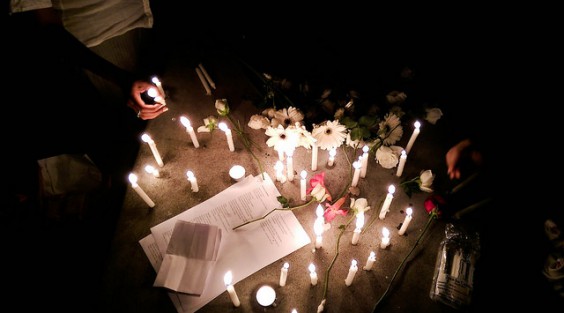On Killing the Messenger

The violent murder of the author Dr. Avijit Roy at the hands of extremists confronts other writers with a choice: stop writing or keep going in the face of death.
At the end of February of this year, Dr. Avijit Roy, a Bangladeshi-born American writer, was hacked to death in Dhaka by Islamists angry over the contents of his liberal, secular-themed blog.

- Pakistan is a country of contradictions – full of promise for growth, modernity and progress, yet shrouded by political, social and cultural issues that undermine its quest for identity and integrity. My bi-monthly column “Pakistan Unveiled” presents stories that showcase the Pakistani struggle for freedom of expression, an end to censorship, and a more open and balanced society.

- Bina Shah is a Karachi-based journalist and fiction writer and has taught writing at the university level. She is the author of four novels and two collections of short stories. She is a columnist for two major English-language newspapers in Pakistan, The Dawn and The Express Tribune, and she has contributed to international newspapers including The Independent, The Guardian, and The International Herald Tribune. She is an alumnus of the International Writers Workshop (IWP 2011).
Dr. Roy and his wife, Rafida Ahmed Banna, who lived in America, had traveled to Dhaka to attend a book fair where his books were being showcased. He was the author of ten books as well as the blog Mukto-Mona, which means “free mind.” The extremists caught the doctor and his wife, and set upon them with machetes, killing Dr. Roy and wounding Ms. Banna, who sustained a grievous head injury and the loss of a finger. The Guardian states that Dr. Roy was “the second Bangladeshi blogger to have been murdered in two years and the fourth writer to have been attacked since 2004.”
As a writer and blogger who lives in a Muslim country – in fact Pakistan and Bangladesh were one country until 1971 – I find it difficult to describe the sorrow I felt when I heard about Dr. Roy’s brutal and senseless murder. Writers work in solitude; sometimes the only thing that keeps us going is the thought of our colleagues, peers and friends, doing the same lonely, intense work that we do. When you hear about a writer or a journalist dying at the end of a long and productive life, you feel a loss, but a loss that makes sense. But when you hear of a writer or journalist being murdered by those who use violence to silence his or her voice, it is as though a flame has been extinguished, leaving you and the rest of your peers in darkness.
What lesson are we to learn from the death of Dr. Avijit Roy? Anjali Khan, writing in the Dhaka Tribune, believes that the takeaway lesson here is that writers should put down their pens and give up writing altogether. “Stop writing,” she writes. “When the machetes come, no one will save you.” Khan goes on to say that freedom of speech is “a myth” and that it is all too easily “sacrificed at the altar of self-interest.”
Indeed, to stop writing altogether was the decision that the Indian writer Perumal Murugan came to in January 2015, when he announced that he was giving up writing and removing all his books from the market. He did this because right-wing Hindu groups threatened him for his novel Madhorubhagan (One Part Woman), in which a woman uses a religious ritual to get pregnant with a stranger.
Murugan called his decision his “death as a creative artist”, pre-empted in no small part by fears that he might actually suffer a physical death at the hands of the hardline Hindu and caste groups who expressed their intense anger over his book. Nobody could truly blame Murugan for choosing the safety of his own person and his family over his writing. Yet people have criticized Murugan for backing down, because of their romantic expectations that the writer will “stand by what he has written” against the anger of an uncontrollable mob of religious extremists.
Of his own writing, Murugan has said, “The novel is not against God or religion. A novel is a work of imagination. When writing a novel, one needs a place, people and context to relate it to.” On the other hand, Dr. Avijit Roy’s writing was defiant in the face of religious extremists, whose zealotry he described as a “highly contagious virus.” His espousal of secular humanist and atheist principles earned him the ire of this virus, which came after him and felled him as effectively as any aggressive cancer.
But the truth is that it doesn’t matter what Dr. Roy or Mr. Murugan wrote. A writer knows that sooner or later, he or she is going to offend someone with what they say. What we do is play the lottery, and hope that the person or group we offend isn’t going to become murderously violent because of the words we wrote.
Some of us choose to write things that may only offend family members, because we believe our blood ties will save us from their retribution. Others choose to take the risk of provoking religious extremists because they believe the risk is worth it. And it’s quite possible that they don’t really believe it will be they who pay the price. Nobody thinks of himself or herself as important enough to be another Salman Rushdie or Taslima Nasreen. As Michael De Dora, a colleague of Dr. Roy’s, said, “His understanding was that he wouldn’t be killed, that if anyone ever tried to attack him or hated him, that they could just kind of have a chat and he would convince them … that they could at least have a dialogue.”
After any murder of a writer, the rest of us face the choice: to keep going or to stop writing. Most of us manage a compromise: either some measure of self-censorship, or we at least put a distance between those who would punish us for our message and ourselves. There is probably no law on earth that can protect the writer from those who believe that death is the ultimate censor. As the Indian writer Tabish Khair, who lives in Denmark, said about this dilemma:
“Freedom of speech is a process of struggle. It was always under attack and always will be. There might be more killings here it there, now or then. But they cannot kill it because it only lives in and as an endless struggle against such killers, and their backers.”





One Comment on "On Killing the Messenger"
It is really good attempt of advocacy of writers,I am proud of the fact that there are people around like you who are pricking the fanatics with their pointed pen.